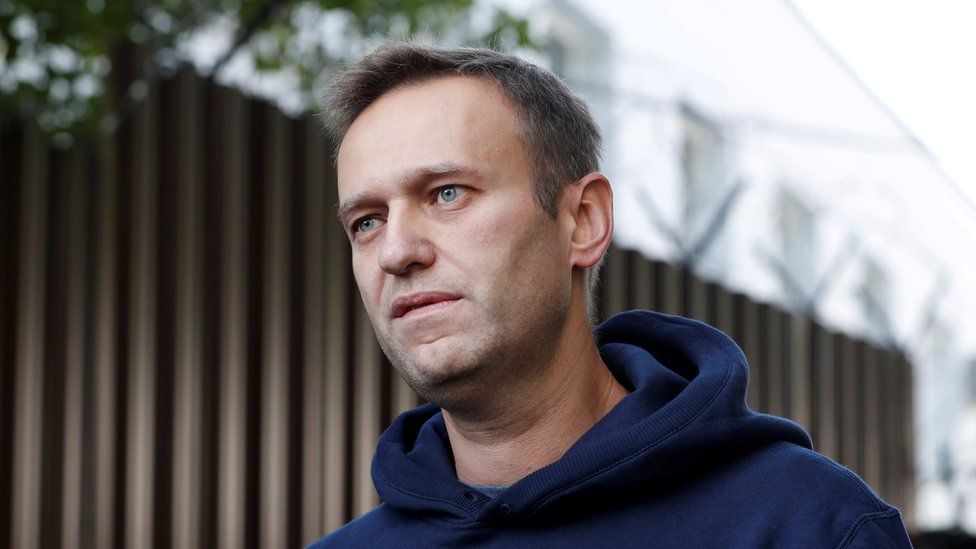Alexei Navalny: UK sanctions for seven Russians over poisoningon August 20, 2021 at 3:27 pm
The staunch critic of President Vladimir Putin almost died in a nerve agent attack last year.

image sourceReuters
The UK is imposing asset freezes and travel bans on seven Russian nationals linked to the poisoning of Russian opposition leader Alexei Navalny.
Mr Navalny – a staunch critic of President Vladimir Putin – almost died from a nerve agent attack last year.
He accused Mr Putin of ordering the attack, something the Kremlin denies.
The UK Foreign Office said the sanctions, taken with the US, targeted those “directly responsible for planning or carrying out the attack”.
All seven of the individuals targeted are members of the Russian Federal Security Service (FSB), it added.
Foreign Secretary Dominic Raab said: “We are sending a clear message that any use of chemical weapons by the Russian state violates international law, and a transparent criminal investigation must be held.
“We urge Russia to declare its full stock of Novichok nerve agents.”
The term Novichok – “newcomer” in Russian – applies to a group of nerve agents developed in a lab by the Soviet Union during the Cold War. They paralyse muscles and can lead to death by asphyxiation.
Mr Navalny, 45, was exposed to one such nerve agent on a flight from Tomsk, Siberia, to Moscow on 20 August 2020. By the time the plane landed, he could not speak and was taken directly to hospital.
He was later transferred to a hospital in Berlin, Germany, where he spent a further 32 days recovering, including 24 days in intensive care.
In January, he returned to Russia and was arrested on arrival.

Anti-corruption campaigner Alexei Navalny has long been the most prominent face of Russian opposition to President Vladimir Putin.
The 45-year-old blogger has millions of Russian followers on social media – many in their early 20s or younger – and managed to get some of his supporters elected to local councils in Siberia in 2020.
So far he has been unable to challenge the president at the ballot box.
Mr Navalny was immediately arrested as he flew back into Moscow on 17 January, after months spent recovering in Berlin from the near-fatal nerve agent attack. His supporters staged mass protests across Russia and police responded with force, detaining thousands for attending the unauthorised rallies.
President Putin’s foremost critic is now at a Russian penal colony, serving a jail term for failing to stick to the terms of a suspended sentence while he was in Berlin. But his voice of opposition has not gone away, even though his supporters fear for his life.

The UK previously imposed sanctions on six Russians, including the director of the FSB, who the government holds responsible for the poisoning.
Imprisoned Mr Navalny marked the anniversary of the poisoning attack against him by urging global leaders to put more attention on combating corruption and to target tycoons close to Mr Putin.
The UK and US also issued a joint statement in which they reaffirmed their condemnation of the “assassination attempt” on Mr Navalny.
The statement added: “We welcome sanctions actions made by international partners and will continue to co-ordinate with international partners on further measures.
“Today the UK and the US join in taking further action against the individuals directly responsible for carrying out the poisoning of Mr Navalny.
“As we did after Russia’s use of a chemical weapon against the Skripals in the United Kingdom in March 2018, we continue to underline that there must be accountability and no impunity for those that use chemical weapons.”
Also on Friday, German Chancellor Angela Merkel said that, in a meeting with Mr Putin, she had “demanded” he free his political opponent. Mr Putin denies Mr Navalny’s imprisonment is politically motivated.
Speaking at the Kremlin, Ms Merkel said: “It’s a depressing situation from our point of view.
“His conviction was on the basis of an earlier court decision that was considered disproportionate by the European Court of Human Rights, so his stay in a penitentiary is not acceptable and I have once again demanded Navalny’s release.”
